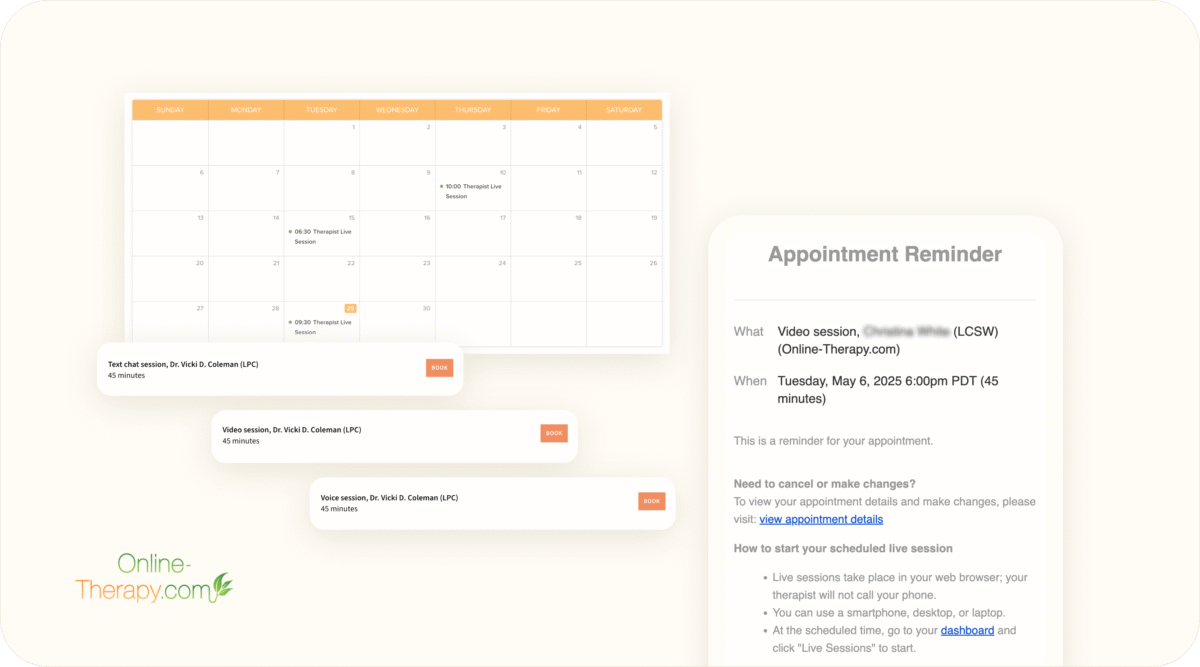

This therapist directory is offered in partnership with BetterHelp. If you sign up for therapy after clicking through from this site, HelpGuide will earn a commission. This helps us continue our nonprofit mission and continue to be there as a free mental health resource for everyone.
Need to talk to someone now? Find a crisis helpline
If you're a BetterHelp therapist with questions about your directory listing, please contact therapists@betterhelp.com
The HelpGuide team personally tested out Online-Therapy.com, attending therapy sessions and trying the platform’s many tools and resources. We also surveyed users' opinions on the therapy platform’s usability, therapist quality, value, and more.

We independently test and review all of the services we recommend. When you sign up through our links, we may earn a commission, which helps support our nonprofit mission.
Online-Therapy.com is a therapy platform specializing in cognitive behavioral therapy (CBT). The service is available in all 50 states, Canada, the UK, Ireland, and Australia. Although it doesn’t accept insurance, Online-Therapy.com offers different subscription plans ranging from $60 to $120 monthly.
A member of the HelpGuide staff tested Online-Therapy.com for a month and took notes on his experiences. We also surveyed over 100 Online-Therapy.com users and asked them to rate different aspects of the service and share their feedback.
We found that the platform had some drawbacks. For instance, 84 percent of users were satisfied with their therapist match, but 10 percent tried several providers without finding a good match. Other users noted technical issues.
However, our tester and most of the users surveyed agreed that the sign-up process was easy, the therapists were caring and helpful, and tools were useful. Among the surveyed users, 87 percent were satisfied or very satisfied with Online-Therapy.com, and 82 percent said they would use it again.
One of our in-house staff members tested Online-Therapy.com for a month and recorded his experiences. He underwent onboarding, attended multiple therapy sessions, contacted customer support, and switched providers. He also tried out the platform’s extra tools and features, such as worksheets, to see if they enhanced the experience. He recorded his findings in a journal each week to chart his progress over time.
In addition to hands-on testing, we surveyed 100 Online-Therapy.com users. Their completed questionnaires allowed us to gauge their feelings toward the platform and collect their opinions on where it shines and falls short. We asked about factors such as platform usability, pricing, privacy concerns, therapist quality, and overall satisfaction.
We then developed a comprehensive review of Online-Therapy.com and compared it to similar online therapy apps.
According to our tester, Online-Therapy’s onboarding process was streamlined. There were 10 questions on the questionnaire, and it took him less than 10 minutes to complete it. During sign-up, he was asked if he had a gender preference in a therapist and if he wanted to work with someone who was LGBTQ-friendly. However, he wasn’t asked if he had a preference for a therapist’s area of focus (such as ADHD or trauma), race, ethnicity, or religion. Matching and scheduling took place instantly following the questionnaire. He felt the service recommended therapists who aligned with his preferences.
90 percent of survey respondents agreed that the sign-up process was easy or very easy, and 78 percent completed it in under 20 minutes. This supports our tester’s opinion that the onboarding was simple and smooth.
34 percent of users wanted more information about therapist qualifications upfront, and 34 percent wanted more clarity around the service’s insurance or payment policies. Like our hands-on tester, 18 percent of users scheduled a first session on the same day they signed up for Online-Therapy.com. 47 percent waited one to three days. 35 percent ended up waiting four days or longer.
Our staff tester found navigating the desktop and mobile versions of Online-Therapy.com very easy. The survey respondents agreed. 88 percent said the platform was easy or very easy to navigate.
Our tester didn’t experience any bugs, crashes, or struggles with using any of the platform’s features. However, 27 percent of surveyed users experienced technical issues that disrupted their experience, and of those, 11 percent said that the tech issues cropped up “many” times. Most of those technical issues involved poor video quality, app crashes, audio issues, or trouble connecting to scheduled sessions.
When our hands-on tester emailed customer support, he received a personalized response within 12 hours. About a quarter of respondents also contacted customer support. And of those, 56 percent received a response within 24 hours. About 43 percent waited a day or more. 91 percent said their issue was resolved, indicating that the support team was dedicated to helping the users.
77 percent of respondents felt confident or very confident that Online-Therapy.com protected their information during sign-up. More users felt confident that their communications with their therapists were secure and private. When asked to rate the platform’s security during sessions, 84 percent gave the platform either a 4 or 5 out of 5.
It’s important to review Online-Therapy.com’s privacy policy for yourself and decide if you’re comfortable with it.
Our hands-on tester was impressed with the first therapist he matched with. “The session was very comfortable. She was professional and wanted to help me get through issues and develop plans,” our tester said of his therapist. The sessions ranged from 45 to 50 minutes in length and involved a mix of casual conversation and more structured goals and exercises. The therapist also showed flexibility, offering to do couples therapy or at least meet our tester’s spouse to better understand his issues.
Each session ended with the therapist giving our tester materials, such as exercises that tied in with the therapy sessions. She also directed him to the platform’s resources, such as worksheets, video lessons, guided yoga, and journals that could be shared with the therapist. Our tester listed the worksheets as one of his favorite features of the platform.
84 percent of survey respondents were also satisfied or very satisfied with their first therapist. One user said, “I was matched with a therapist who understood my needs and was transparent about the best care plan and tools that would benefit me.” 63 percent reported a mix of structured and casual sessions. Most reported that their therapists were empathetic and understanding during sessions and responsive between sessions.
Although our staff member was satisfied with his first therapist, he switched providers. Our tester said he accomplished this quickly and easily, and the platform offered him a list of therapists to choose from.
Only 20 percent of surveyed users switched therapists. Out of those who did switch, 85 percent agreed that the process was easy or very easy.
Online-Therapy.com offers multiple pricing tiers: $60, $90, and $120 a week, billed monthly. The cheapest option allows for unlimited messaging and access to the therapy program, but no actual live lessons. The standard plan—which our tester selected—allows for one live session a week, along with unlimited messaging and the therapy program. The most expensive plan adds a second live session per week.
Overall, the standard plan is cheaper than the average out-of-pocket cost of in-person therapy in the United States, which is between $100 and $200 per session. It’s closer in price to some of the competing online therapy platforms. For example, BetterHelp’s pricing ranges from $65 to $100 per week, and Talkspace’s starting price ranges between $69 and $109 per week.
Online-Therapy.com doesn’t accept insurance, which can be a hurdle for users hoping to rely on their insurance plan. However, users can benefit from the platform’s discounts or may be reimbursed by their insurance provider. Our staff tester used HelpGuide’s discount code for a discount on the first month of sessions. Among survey respondents, 19 percent managed to reduce the cost with a discount or financial aid.
When asked to rate the value of the service in relation to its cost, 78 percent of survey respondents gave Online-Therapy.com either a 4 or 5 out of 5. Our tester also said it was excellent value, especially considering all of the resources included in the subscription. However, he said he would’ve liked more live group therapy or class options.
Online-Therapy.com was mostly transparent with its pricing. 73 percent of respondents said they didn’t encounter any surprise charges. Our hands-on tester reported that the cancellation and refund policies were easy to find on the website. Canceling his subscription only took a minute, but a plan needs to be canceled before the next billing period starts.
Online-Therapy.com stands out from competing therapy platforms in the following ways:
Useful therapy tools. Our tester was really impressed with the platform’s “therapy toolbox,” which included worksheets, yoga videos, and other mental health resources to supplement the live sessions.
Fast sign-up and therapist matching process. Our hands-on tester spent time using both Online-Therapy.com and BetterHelp, and after testing both, he said he preferred the former’s therapist matching process. Additionally, 90 percent of survey users said Online-Therapy.com’s sign-up process was easy or very easy.
Caring and responsive therapists. 71 percent of users said their therapist responded to their between-session messages quickly or very quickly. Therapists also generally received high marks for being empathetic and understanding.
Here are a few ways in which Online-Therapy.com could better serve its users.
Build its network of providers. 10 percent of users said they never found a good therapist match. This might indicate that, although the therapists on the platform are often well-regarded by users, the pool of therapists might be too limited.
Offer more clarity around pricing. Although our tester understood the pricing tiers, a little more than a quarter of surveyed users said they encountered surprise charges. It’s possible that the platform could do more to explain the different tiers, what they include, and how billing works.
Improve platform functionality. Problems ranging from poor video quality to app crashes can get in the way of otherwise productive therapy sessions. 19 percent of users said the technical issues disrupted their sessions more than once, so there’s room for improvement here.
Online-Therapy.com appears on our list of Best Online Therapy Platforms, alongside BetterHelp, Brightside, and Talkspace. The platform is ideal if you’re looking for mental health support that involves CBT and are eager to try out between-session activities like journaling and yoga. A short onboarding process also makes the platform a good option for those who want to get started immediately and don’t want to fill out a lengthy questionnaire.
The fact that Online-Therapy.com doesn’t accept insurance can be a significant drawback if you’re hoping to use your insurance plan to cover sessions. Online-Therapy.com also has a smaller pool of therapists when compared to platforms like Talkspace and BetterHelp. You could consider starting your journey with Online-Therapy.com and then moving on to a larger platform if you can’t find the right provider.
We’d love to hear from you! Your feedback helps us improve and make sure you’re finding the support and information you need.
Millions of readers rely on HelpGuide.org for free, evidence-based resources to understand and navigate mental health challenges. Please donate today to help us save, support, and change lives.
Donate to HelpGuide.org today